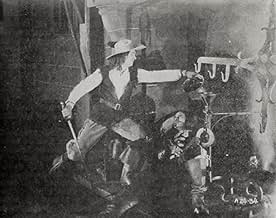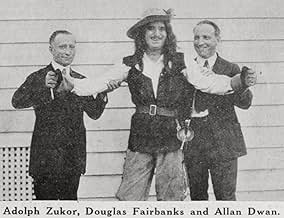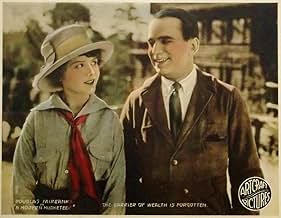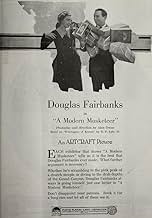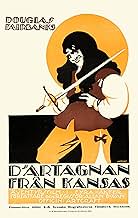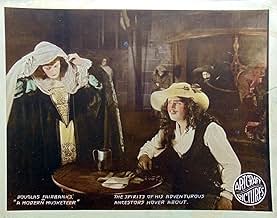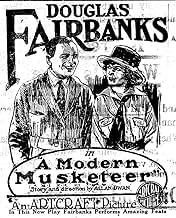Agrega una trama en tu idiomaA restless young man travels west, encountering adventure, romance, and danger.A restless young man travels west, encountering adventure, romance, and danger.A restless young man travels west, encountering adventure, romance, and danger.
- Dirección
- Guionistas
- Elenco
- Dirección
- Guionistas
- Todo el elenco y el equipo
- Producción, taquilla y más en IMDbPro
Opiniones destacadas
This Douglas Fairbanks vehicle has been noted for its scenes of Fairbanks dressed as D'Artagnan ("The Three Musketeers") anticipating the star's later redirection of his career in the 1920s to more prestigious, costume/historical swashbucklers. Otherwise, "A Modern Musketeer" is similar to the usual modern comedies Fairbanks made before "The Mark of Zorro" and "The Three Musketeers" transformed his career. His scenes as D'Artagnan are only a small part of the picture-mostly the opening sequence where Doug swordfights every man in a tavern to humorously retrieve a lady's handkerchief. Framing this sequence, Fairbanks literally winks at the camera, which the Flicker Alley commentary suggests was to reassure audiences that they were watching the same old Doug, who had by this time firmly established a popular comedic screen persona.
I like Fairbanks's comedies and have viewed about every complete one I could find on home video, but, admittedly, even the best formulas eventually get tiresome and in need of some revision and innovation. The first part of "A Modern Musketeer" is, thus, interestingly unusual. Besides the opening swashbuckling, other sequences seem to be in non-chronological order: first, there's a mythological past of D'Artagnan with a modern sense of humor, then a near-contemporary scene where modern Doug destroys another, but modern, tavern, as he again knocks men about to defend a woman's honor, followed by the cyclone scene of Doug's character's birth and, then, another near-present scene on a streetcar involving giving up seats for ladies. After this, we mostly follow the main chronological story as our hero leaves home and eventually saves the day at the Grand Canyon.
As in his other comedies, Fairbanks is established as out-of-place in modern society, for his restless exuberance and chivalry at the expense of clobbering any fellow seeming to be in his way. The film suggests that this kind of man was more at home in the past, such as in the case of D'Artagnan. The setting of historical swashbucklers befitted Fairbanks's persona, whereas the modern comedies found their comedy in Fairbanks's awkwardness in modern times and his transformation within those constraints. He doesn't belong in his small hometown in Kansas, so he leaves for adventure.
Overall, this is a good Fairbanks comedy. It's the earliest one I've seen directed by Allan Dwan, who was taking over for John Emerson as the star's main director. Apparently, scenarist and title writer Anita Loos had also already departed from Fairbanks's team of filmmakers, but her influence continued to be seen in witty title cards such as this one: "After Fording the desert-- Note:--please pardon the pun." The "note" part, as the DVD commentary points out, is a clever jab at D.W. Griffith, who included historical footnotes, often dubiously, in title cards for his historical epics, such as "The Birth of a Nation".
Some final technical notes: the tornado scene features some decent special effects for 1917, including the use of miniatures. Lots of structures fall over and apart, but there isn't nearly enough dust blowing around to make the scene more realistic. This sequence and the dam break climax in Fairbanks's "When the Clouds Roll by" seem to have had a strong influence on Buster Keaton, who included similar scenes in his later comedies. Additionally, the direction and editing are generally sharp here, as in other Fairbanks's films, but there is one particularly sloppy match-on-action cut about 30 minutes in where there's a temporal replay as the scene cuts to a closer view. Finally, the photography of the Grand Canyon is pretty good.
I like Fairbanks's comedies and have viewed about every complete one I could find on home video, but, admittedly, even the best formulas eventually get tiresome and in need of some revision and innovation. The first part of "A Modern Musketeer" is, thus, interestingly unusual. Besides the opening swashbuckling, other sequences seem to be in non-chronological order: first, there's a mythological past of D'Artagnan with a modern sense of humor, then a near-contemporary scene where modern Doug destroys another, but modern, tavern, as he again knocks men about to defend a woman's honor, followed by the cyclone scene of Doug's character's birth and, then, another near-present scene on a streetcar involving giving up seats for ladies. After this, we mostly follow the main chronological story as our hero leaves home and eventually saves the day at the Grand Canyon.
As in his other comedies, Fairbanks is established as out-of-place in modern society, for his restless exuberance and chivalry at the expense of clobbering any fellow seeming to be in his way. The film suggests that this kind of man was more at home in the past, such as in the case of D'Artagnan. The setting of historical swashbucklers befitted Fairbanks's persona, whereas the modern comedies found their comedy in Fairbanks's awkwardness in modern times and his transformation within those constraints. He doesn't belong in his small hometown in Kansas, so he leaves for adventure.
Overall, this is a good Fairbanks comedy. It's the earliest one I've seen directed by Allan Dwan, who was taking over for John Emerson as the star's main director. Apparently, scenarist and title writer Anita Loos had also already departed from Fairbanks's team of filmmakers, but her influence continued to be seen in witty title cards such as this one: "After Fording the desert-- Note:--please pardon the pun." The "note" part, as the DVD commentary points out, is a clever jab at D.W. Griffith, who included historical footnotes, often dubiously, in title cards for his historical epics, such as "The Birth of a Nation".
Some final technical notes: the tornado scene features some decent special effects for 1917, including the use of miniatures. Lots of structures fall over and apart, but there isn't nearly enough dust blowing around to make the scene more realistic. This sequence and the dam break climax in Fairbanks's "When the Clouds Roll by" seem to have had a strong influence on Buster Keaton, who included similar scenes in his later comedies. Additionally, the direction and editing are generally sharp here, as in other Fairbanks's films, but there is one particularly sloppy match-on-action cut about 30 minutes in where there's a temporal replay as the scene cuts to a closer view. Finally, the photography of the Grand Canyon is pretty good.
'The Modern Musketeer', now complete and restored thanks to the efforts of the Danish Film Archive, is a fun modern adventure film starring the ever smiling Douglas Fairbanks (Snr). The first scenes show our hero as D'Artagnan of the Three Musketeers, swashing a buckle to rescue a young lady's handkerchief, before fast forwarding to modern times where Ned Thacker, his mother obsessed with the Dumas novel, has been brought up to be chivalrous (and rather irritating) where young ladies are concerned.
When Ned decides to leave for the big wide world in his new car - not until after he's climbed the church spire (as you do) - he meets Elsie Dodge, who's being railroaded into marriage with an unpleasant and cheating millionaire. Falling for Elsie he first lets her share his lunch hamper, then saves her from a fate worse than death at the hands of the local Injun (man with teeth necklace who thinks that makes him king).
Great action sequences involving ropes, jumps, and various acrobatics prefigure Fairbanks' later cinematic adventures. Marjorie Daw plays Elsie as the blushing young ingénue, while Tully Marshall pops up as a wronged man out for revenge. Although this film loses its way somewhat - starting as a likable comedy and then becoming a wild west adventure - it wears its years well and is worth a look.
When Ned decides to leave for the big wide world in his new car - not until after he's climbed the church spire (as you do) - he meets Elsie Dodge, who's being railroaded into marriage with an unpleasant and cheating millionaire. Falling for Elsie he first lets her share his lunch hamper, then saves her from a fate worse than death at the hands of the local Injun (man with teeth necklace who thinks that makes him king).
Great action sequences involving ropes, jumps, and various acrobatics prefigure Fairbanks' later cinematic adventures. Marjorie Daw plays Elsie as the blushing young ingénue, while Tully Marshall pops up as a wronged man out for revenge. Although this film loses its way somewhat - starting as a likable comedy and then becoming a wild west adventure - it wears its years well and is worth a look.
This will be one of the more enjoyable silent movies you'll come across - restored by the Danish Film Institute and of very good quality, and starring one of the greats of the silent era - Douglas Fairbanks, Sr. - as Ned Thacker, a man raised in Kansas being read the stories of D'Artagnan by his mother, and who grows up to be a modern day version of the musketeer, defending the honour of women at every step.
The movie opens with two really good fight scenes - a swashbuckling look back at D'Artagnan (also played by Fairbanks) as he fights to re-claim a woman's handkerchief, and our first look at Thatcher in a bar-room brawl as he defends the honour of a woman he thought was being treated poorly by her male companion. These were both fun scenes, and I enjoyed the unexpected humour as we got a glimpse of how Ned started his career as a chivalrous man by being arrested on a streetcar as he demands that a man give up his seat for two women, only to discover that the man was the chief of police! So the story had a good start.
If it lost its way a bit, it was in the decision to then focus exclusively on Ned's pursuit of Elsie Dodge (Marjorie Daw) - a young woman being forced by her mother into a relationship with a rich man in order to help pay bills. I thought the story might have been more effective if it had continued to be a series of vignettes of Thacker defending women in various circumstances. The move into the Grand Canyon, and the introduction of the bad Indian Chin-de-dah (Frank Campeau) - who fancies himself a king and decides he's going to kidnap and marry Elsie - struck me as an unnecessary diversion, which ended up as far more than a diversion - it becomes the story.
Still, if that goes a little too far, this was still a fun movie. There's no doubt about that. I enjoyed Fairbanks. Overall I thought both the movie and Fairbanks had the feel of something you might have seen remade by Bob Hope in the 1940's - a light, silly, Western-oriented comedy. A typical line, for example, that I could easily have seen put on Hope's mouth (which, of course, in this is simply a caption) comes as Ned and Elsie look at the splendour of the Grand Canyon and Ned says "Golly. A gully." That's the sort of light comedy I hear coming from Hope's mouth. This has a lot of that, and some good action scenes, and those opening fight scenes that really do draw you in. (7/10)
The movie opens with two really good fight scenes - a swashbuckling look back at D'Artagnan (also played by Fairbanks) as he fights to re-claim a woman's handkerchief, and our first look at Thatcher in a bar-room brawl as he defends the honour of a woman he thought was being treated poorly by her male companion. These were both fun scenes, and I enjoyed the unexpected humour as we got a glimpse of how Ned started his career as a chivalrous man by being arrested on a streetcar as he demands that a man give up his seat for two women, only to discover that the man was the chief of police! So the story had a good start.
If it lost its way a bit, it was in the decision to then focus exclusively on Ned's pursuit of Elsie Dodge (Marjorie Daw) - a young woman being forced by her mother into a relationship with a rich man in order to help pay bills. I thought the story might have been more effective if it had continued to be a series of vignettes of Thacker defending women in various circumstances. The move into the Grand Canyon, and the introduction of the bad Indian Chin-de-dah (Frank Campeau) - who fancies himself a king and decides he's going to kidnap and marry Elsie - struck me as an unnecessary diversion, which ended up as far more than a diversion - it becomes the story.
Still, if that goes a little too far, this was still a fun movie. There's no doubt about that. I enjoyed Fairbanks. Overall I thought both the movie and Fairbanks had the feel of something you might have seen remade by Bob Hope in the 1940's - a light, silly, Western-oriented comedy. A typical line, for example, that I could easily have seen put on Hope's mouth (which, of course, in this is simply a caption) comes as Ned and Elsie look at the splendour of the Grand Canyon and Ned says "Golly. A gully." That's the sort of light comedy I hear coming from Hope's mouth. This has a lot of that, and some good action scenes, and those opening fight scenes that really do draw you in. (7/10)
Boyish adventurer Douglas Fairbanks (as Ned Thacker) imagines himself as an Alexandre Dumas-like "D'Artagnan of Kansas", but local town-folk aren't taken by his chivalrous "Three Musketeers" routine. On the road seeking greener pastures, Mr. Fairbanks meets sweet young Marjorie Daw (as Elsie Dodge). She is promised, however, to middle-aged millionaire Eugene Ormonde (as Forrest Vandeteer). Their love story takes a back seat to Fairbanks' athletic antics, with trusty Tully Marshall (as James Brown) providing his usual good support.
Tully comes in handy when Navajo nasty Frank Campeau (as Chin-de-dah) goes out looking for a "white woman" for sex - of course, she's also Fairbanks' choice for a mate. A Native American Indian, Mr. Campeau greets Fairbanks by saying "How," and ends up with egg on his face. The cast and crew stay at the El Tovar Hotel, with the backdrop of Arizona's "Grand Canyon" providing an exciting location for Fairbanks and company. "A Modern Musketeer" was missing a couple of reels until recently. Now, a full-length restoration is available.
***** A Modern Musketeer (12/30/17) Allan Dwan ~ Douglas Fairbanks, Marjorie Daw, Tully Marshall, Frank Campeau
Tully comes in handy when Navajo nasty Frank Campeau (as Chin-de-dah) goes out looking for a "white woman" for sex - of course, she's also Fairbanks' choice for a mate. A Native American Indian, Mr. Campeau greets Fairbanks by saying "How," and ends up with egg on his face. The cast and crew stay at the El Tovar Hotel, with the backdrop of Arizona's "Grand Canyon" providing an exciting location for Fairbanks and company. "A Modern Musketeer" was missing a couple of reels until recently. Now, a full-length restoration is available.
***** A Modern Musketeer (12/30/17) Allan Dwan ~ Douglas Fairbanks, Marjorie Daw, Tully Marshall, Frank Campeau
Douglas Fairbanks (Ned Thacker) was living with his parents in his mid-30's? He was a bit older than his character, but his athleticism makes up for him acting like a much younger man. This is Fairbanks before "The Mark of Zorro", "The Three Musketeers", "Robin Hood", or "The Thief of Baghdad" and it's his athleticism that makes this movie stand out. He's climbing church steeples, shimmying down street lamps and drain pipes, handstands on the edge of the Grand Canyon - all to save the damsel in distress Elsie Dodge (Marjorie Daw).
Ned can't help it though! His mother was reading The Three Musketeers and similar stories while she was pregnant with Ned and apparently kept reading The Three Musketeers until the time Ned left the home. Mr. Thacker (no name was given for this actor) bought Ned a Ford to leave home with. How do I know it's a Ford? There's an inter title stating, "After Fording (Fording is underlined) the desert, they reach the vicinity of El Tovar. Note:- Please pardon the pun." Ned meets up with Elsie, her mother, Forrest Vandeteer (aka Forest Barris and the richest man in Yonkers), and his driver in the middle of nowhere. Ned's ingenuity managed to drive his Ford and Vandeteer's car on deserted railroad tracks that conveniently go right past the El Tovar lodge near the edge of the Grand Canyon. Ned's ingenuity causes the French driver of Vandeteer's car to comment that this is why the Yankees will help beat the Germans.
Well, Ned doesn't beat the Germans in "A Modern Musketeer", but to avoid spoiling the fun of watching this movie, I won't mention who does beat in the end. And how!
Ned can't help it though! His mother was reading The Three Musketeers and similar stories while she was pregnant with Ned and apparently kept reading The Three Musketeers until the time Ned left the home. Mr. Thacker (no name was given for this actor) bought Ned a Ford to leave home with. How do I know it's a Ford? There's an inter title stating, "After Fording (Fording is underlined) the desert, they reach the vicinity of El Tovar. Note:- Please pardon the pun." Ned meets up with Elsie, her mother, Forrest Vandeteer (aka Forest Barris and the richest man in Yonkers), and his driver in the middle of nowhere. Ned's ingenuity managed to drive his Ford and Vandeteer's car on deserted railroad tracks that conveniently go right past the El Tovar lodge near the edge of the Grand Canyon. Ned's ingenuity causes the French driver of Vandeteer's car to comment that this is why the Yankees will help beat the Germans.
Well, Ned doesn't beat the Germans in "A Modern Musketeer", but to avoid spoiling the fun of watching this movie, I won't mention who does beat in the end. And how!
¿Sabías que…?
- TriviaMarjorie Daw and Kathleen Kirkham, daughter and mother, were seven years apart in age. Daw was only 15(!) when this film was made, which means that she was closer in age to the actress playing her mother than she was to the actor playing her leading man (Douglas Fairbanks was 18 years her senior).
- ErroresWhen Chin-de-dah leads Vandeteer and Elsie through the Canyon, the shadows of the cameraman and another crew member are visible on the ground.
- Créditos curiososExcept for Douglas Fairbanks, whose name appears above the title, there is no cast list. Actors are introduced by intertitle cards just before they appear on the screen. The IMDb cast list therefore uses this "order of appearance" sequence.
- Versiones alternativasIn 2006, the Danish Film Institute copyrighted a 68-minute version of this film, with a musical score played by the Mont Alto Orchestra. Additional restoration and music credits stretch the time to 69 minutes.
- ConexionesReferenced in Chaplin (1992)
Selecciones populares
Inicia sesión para calificar y agrega a la lista de videos para obtener recomendaciones personalizadas
Detalles
- Fecha de lanzamiento
- País de origen
- Idiomas
- También se conoce como
- Un mosquetero moderno
- Locaciones de filmación
- Productora
- Ver más créditos de la compañía en IMDbPro
- Tiempo de ejecución1 hora 8 minutos
- Mezcla de sonido
- Relación de aspecto
- 1.33 : 1
Contribuir a esta página
Sugiere una edición o agrega el contenido que falta

Principales brechas de datos
By what name was A Modern Musketeer (1917) officially released in Canada in English?
Responda
